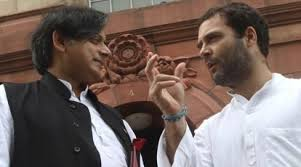“We are a more self-confident, more developed, and in many ways a stronger democracy. Yet, the lessons of the Emergency remain relevant in troubling ways," writes Congress leader and a seasoned lawmaker Shashi Tharoor.
In an Op-ed article titled 'Heeding the Lessons of India’s Emergency' for project-syndicate.org; Tharoor warned against the temptation to centralise power, silence dissent those may bypass constitutional safeguards.
“Often, such tendencies may be justified in the name of national interest or stability. In this sense, the Emergency stands as a strong warning. The guardians of democracy must always remain vigilant," Tharoor said.
The state of Emergency imposed by Prime Minister Indira Gandhi 50 years ago showed how the erosion of freedom often happens – subtly at first, with the chipping away of seemingly minor liberties in the name of virtuous-sounding causes. It should thus serve as a potent warning: democratic stalwarts must be eternally vigilant.
"On June 25, 1975, India awoke to a new reality. The airwaves crackled not with the usual government pronouncements, but with a chilling decree: a state of emergency had been declared.
For 21 long months, fundamental rights were suspended; the press was muzzled; and political dissent was brutally suppressed. The world’s largest democracy held its breath, as the very essence of its constitutional promise – liberty, equality, fraternity – was severely tested. Fifty years on, the period remains etched in Indians’ collective memory as the “Emergency".
The judiciary buckled under immense pressure to back the move, with the Supreme Court even upholding the suspension of habeas corpus and citizens’ fundamental right to liberty. Journalists, activists, and opposition leaders found themselves behind bars. The broad constitutional transgressions enabled a horrifying litany of human-rights abuses. Torture in detention and extrajudicial killings – though less publicized at the time – were dark realities for those who dared to defy the regime.
In fact, the quest for “discipline” and “order” often translated into unspeakable cruelty, exemplified by the forced vasectomy campaigns led by Gandhi’s son, Sanjay, and concentrated in poorer and rural areas, where coercion and violence were used to meet arbitrary targets. Slum demolitions, carried out with ruthless efficiency in urban centers like New Delhi, rendered thousands homeless, with little to no concern for their welfare.
The Kerala MP also says:
"The silencing of dissent, the curtailment of fundamental rights to assemble, write, and speak freely, and the blatant contempt for constitutional norms left an indelible scar on India’s polity. Though the judiciary eventually found its spine, its initial faltering would not quickly be forgotten.
And the period’s “excesses” caused deep and lasting harm to countless lives, leaving a legacy of trauma and mistrust in affected communities – which they demonstrated by overwhelmingly voting Gandhi and her party out of power in the first free elections after the Emergency was lifted, in March 1977".
He further notes: "The 50th anniversary of the declaration of the Emergency – which comes at a time of deep polarization and challenges to democratic norms in many countries – is an occasion for historical reflection and introspection.
The Emergency offered a vivid demonstration of how fragile democratic institutions can be, even in a country where they are ostensibly robust. It reminded us that a government can lose its moral compass and sense of accountability to the people it purports to serve.
And it showed how the erosion of freedom often happens: subtly at first, with the chipping away of seemingly minor liberties in the name of virtuous-sounding causes, until “family planning” and “urban renewal” become forced sterilizations and arbitrary home demolitions.
The lessons of this experience are manifold and enduring, he remarked.
 |
| Marked a gory chapter in India's politics |
Link
"The lessons of this experience are manifold and enduring".
"First, freedom of information and an independent press are of paramount importance. When the fourth estate is besieged, the public is deprived of the information it needs to hold political leaders accountable. That said, the cravenness of many media outlets in the face of intimidation remains inexcusable," he diagnosed.
Second, democracies depend on an independent judiciary able and willing to serve as a bulwark against executive overreach. Judicial capitulation – even when temporary – can have severe and far-reaching consequences.
"The third lesson – perhaps the most pertinent in our current political climate – is that an overweening executive, backed by a legislative majority, can pose a grave danger to democracy, especially when that executive is convinced of its own infallibility and impatient with the checks and balances that are essential to democratic systems."
ends







No comments:
Post a Comment